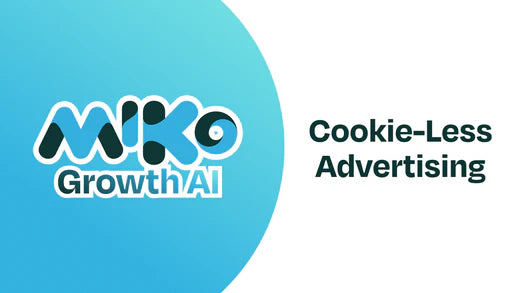<p><span style="font-weight: 400;">Cookies have been a part of Internet life since Netscape first </span><a href="https://qz.com/2000350/the-inventor-of-the-digital-cookie-has-some-regrets"><span style="font-weight: 400;">introduced them</span></a><span style="font-weight: 400;"> in the early 1990s. A deceptively simple innovation allowing websites to “remember” user data, cookies have ushered in the current age of Internet marketing. But now, that age is rapidly coming to an end — and Miko is already equipped for what’s next. </span></p>
<h2><span style="font-weight: 400;">The end of third-party cookies</span></h2>
<meta charset="utf-8">
<p><span>Key players like </span><a href="https://www.bloomberg.com/news/articles/2021-04-26/how-apple-google-are-killing-the-advertising-cookie-quicktake"><span>Google and Apple</span></a><span> have already promised to phase out support for third-party cookies, citing privacy concerns. Although Google Chrome (the browser of choice for 60% of the internet’s users) says it will now support third-party cookies </span><a href="https://www.searchenginejournal.com/google-gives-third-party-cookies-another-year/459412/"><span>until 2024</span></a><span>, the cookie’s fate has long been sealed. Runner-up browsers Safari (18.8%) and Firefox (2.5%) have already called it quits on cookies, and numerous minor browsers have followed suit. By the time Google Chrome does away with them, we’ll be living in a virtually cookie-less world.</span> </p>
<p><span style="font-weight: 400;"><img alt="" src="https://cdn.shopify.com/s/files/1/0122/4212/4862/files/Miko_AI_Marketing_Cookie-Less_Advertising.png?v=1678989786"></span></p>
<p><span style="font-weight: 400;"></span><span style="font-weight: 400;">What does this mean for marketers? The way brands have reached audiences — and made money from online ads — is about to be completely upended. Simply put, the time to develop a cookie-less strategy is now, and the brands that do so will gain a significant competitive edge. </span></p>
<h2><span style="font-weight: 400;">Miko’s cookie-free strategy</span></h2>
<p><span style="font-weight: 400;">At Miko, innovation is in our DNA. We’re continually exploring what’s next, and we’ve already begun building a cookie-less strategy that future-proofs our marketing. At the heart of that strategy is less dependency on pixel data, which safeguards us against the inevitable ad platform changes coming down the line. (Hint: Making our website cookie-less is just the beginning.)</span></p>
<p><span style="font-weight: 400;"> </span></p>
<p><span style="font-weight: 400;">Although a cookie-less strategy might inspire fear in most marketers, the shift doesn’t have to come at the cost of efficient targeting. With a first-mover advantage, Miko is proving that a brand’s customer acquisition cost (CAC) can be just as optimized in the cookie-free universe. Here’s how we’re doing it.</span></p>
<h3>1. Focus on measurement, not just targeting</h3>
<p><span style="font-weight: 400;">In the cookie-less world, it will become more difficult to track user behavior, and targeting will be less accurate. That’s why we’re expanding our focus beyond targeting alone. By measuring the impact of our advertising campaigns and adapting them accordingly, we will continue to optimize our efforts even after we’re no longer able to leverage cookie data.</span></p>
<h3>2. Own our data and the consumer relationship</h3>
<p><span style="font-weight: 400;">We’re also prioritizing consumer relationships. With the end of third-party cookies, first-party data becomes mission-critical. Our robust in-house measurement and communication capabilities will help ensure that we have the data required to truly understand our target audiences.This is another area in which we’re leading the pack now and continually optimizing our efforts to yield an even lower CAC.</span></p>
<h3>3. Enhance data utilization through close publisher relationships</h3>
<p><span style="font-weight: 400;">In the absence of cookies, publishers will be responsible for tracking user data themselves. Inside Google’s </span><a href="https://www.inc.com/peter-roesler/rip-third-party-cookies-what-you-need-to-know.html"><span style="font-weight: 400;">“Privacy Sandbox,”</span></a><span style="font-weight: 400;"> where this user data will be contained, a technology called Federated Learning of Cohorts (FLoC) will collect data and organize them into relevant groups. This is designed to both alleviate the need for individually classifying user profiles and maintain accurate targeting. By continuing to build comprehensive, mutually beneficial relationships with publishers, Miko won’t just gain access to these technologies; we’ll be able to leverage them to reach prospects in our post-cookie world.</span></p>
<p><span style="font-weight: 400;">Fueled by an early mover advantage, Miko is already adopting cookie-free strategies that will become critical for every brand that advertises online. Our website will soon be cookie-free, and our in-house capabilities will ensure that we’re still able to optimize our CAC — even without cookies as a tool.</span></p>







